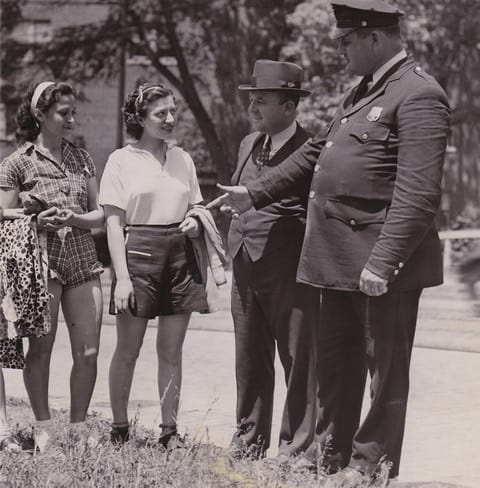
Ann Hochman and Florence Rosenthal being challenged by Alderman William Slater and patrolman Harry Uhrich trying to enter Aqueduct Road in Yonkers while wearing shorts. This photo was taken in 1936, before Yonkers Alderman adopted the Slater resolution.
By Mary Hoar, City of Yonkers Historian, President Emerita Yonkers Historical Society, recipient of the 2004 Key to History, Member of the Yonkers Landmarks Preservation Board, and President Untermyer Performing Arts Council
Monday, June 19th
June 19, 1950: Two men from the Ninth Ward Civic Association managed to do what “couldn’t be done,” settle the six-month strike by Local 456 Teamsters and Chauffeurs Union against E. Rabinowe & Company! Association President Stanley Carpenter and Director William Henry, 1949 Labor candidate for Yonkers Mayor, acted as mediators; they led both sides to make concessions and reach an agreement to end the rancorous strike marked by violent clashes between workers and management. Carpenter and Henry announced, “Joint pledges were given by all parties that relations will be resumed on a harmonious basis. Normal operations will commence immediately.” Rumored circulated both sides would drop the multiple criminal complaints lodged because of the violence resulting from the job action; some charges resulted in indictments, while others were pending in Special Sessions Courts.
Tuesday, June 20th
June 20, 1947: Dubbed the “Hero of Nodine Hill,” former GI John D’Ambrosio saved two four-year-olds from certain death from a fire they started at 331 Walnut Street! D’Ambrosio, who ran a stationery store in the building, saw the flames and heard the boys screaming in terror. He fought his way back into the building; the smoke was so dense, he couldn’t see, but followed the sounds of their screams. He reached the crying boys, grabbed and removed them seconds before that spot burst into flames. After giving the children to adults watching the fire, he ran back in to ensure everyone was out.
Wednesday, June 21st
June 21, 1907: The German Odd Fellows purchased the Tuckahoe Road home of James Courter, first Mayor of Yonkers, to use as a residence for old people for $41,000. The building later became Hebrew National Orphan Home.
June 21, 1945: The Yonkers War Finance Committee announced our men and women in the Armed Forces purchased war bonds totaling $157,760, and credited the sales to Yonkers.
Thursday, June 22nd
June 22, 1939: After raiding a dentist’s suite in the First National Bank Building at 20 South Broadway, Yonkers Police Chief Edward Quirk and his YPD team discovered a “clearing house for a big New York City policy ring.” More than 1,000,000 policy slips, adding machines, record books, a telephone and other equipment were removed for evidence. Four arrests were made, people from the Bronx or Manhattan. Captain Monson, superintendent of the building, had become suspicious and tipped off Quirk. The ring had sublet a small room in the dental office and operated after the dental practice was closed.
June 22, 1940: The Yonkers Kiwanis Club quartet tied for second place and qualified for the finals of the National Barbershop Quartet! Held on the plaza outside the New York City Building at the World’s Fair, the competition was attended by more than 200 Yonkers people led by Kiwanis President Frank Wartur. Clad in clothing from the 1890s, the competitors vying to bring the title back to Yonkers were Patrick O’Hara, Merritt Cline, Fred Thom and Edward Burstell.
Friday, June 23rd
June 23, 1906: The Hollywood Inn opened its roof garden; highlights of the garden were soft drinks, ice cream and outdoor furniture.
June 23, 1945: Earl Browder of Highland Place was stripped of his power as President of the Communist Political Association, replaced by a three-man secretariat. Browder had fallen into disfavor by members because not only had he led in the “dissolution” of the Communists as a political party, he also committed the group to supporting the US “free enterprise system.” According to Jacques Duclos, head of the French Communist Party, Browder had “swerved dangerously” from Communist dogma.
Saturday, June 24th
June 24, 1928: The County Park Commission announced it would keep the name Tibbetts Brook Park since the name was “established thorough long usage.” It had been considering a request to change the name back to Tippets, the correct original spelling of the family name as found on official maps of Yonkers in the 1700s. The Tippets family had purchased the land from Elias Doughty, Adriaen Van der Donck’s brother-in-law, and later lost it because they were loyalists.
June 24, 1954: The Alexander Smith Carpet Mill closed forever and moved to Greenville, Mississippi. In 1956 Smith Carpet merged with Mohawk Carpet; the newly formed company was named the Mohasco Corporation. Two years after leaving Yonkers, Alexander Smith and Sons Carpet Company was no more.
Sunday, June 25th
June 25, 1932: Firefighter John Moore climbed an 85-foot ladder to rescue a scared cat, stuck high in a tree on Highland Avenue.
June 25, 1935: Although the recipient of kidding from the other Aldermen, William Slater continued his campaign against seeing girls with bare knees. He claimed his observations at Tibbetts Brook Park and streets in Yonkers led him to announce the situation was “much improved,” but he intended to continue his efforts to rid Yonkers of “the evil.” He would question residents in his district, the Ninth Ward and continue speaking about his views on the subject, addressing the Ninth Ward Democratic Club. He planned to bring the topic to the next Common Council meeting, supported by a large number of Ninth Ward residents. When questioning his constituents, he also would ask their feelings on the sanitation of the pools at Tibbetts and the park in general.
June 25, 1941: The three biggest companies in Yonkers— Smith Carpet, Otis and Habirshaw— announced they would restrict production for the next week to allow employees to take their annual vacation. Otis and Habirshaw gave workers the option to work and accept additional vacation pay if they chose to work instead of taking a vacation.
Questions or comments? Email YonkersHistory1646@gmail.com. For information on the Yonkers Historical Society, Sherwood House and upcoming events, please visit our website www.yonkershistoricalsociety.org, call 914-961-8940 or email info@yonkershistoricalsociety.org.





